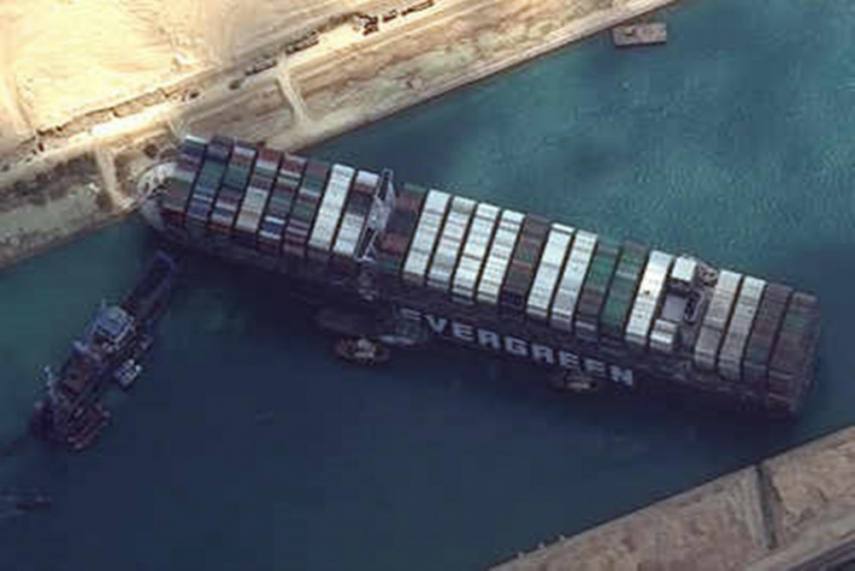The Suez Canal in Egypt is an important artery of world trade. Trade between East and West runs through the Suez, which connects the Mediterranean and the Red Sea. However, the huge container ship MV Ever Given lost its way due to the storm and got stuck on the shores of Suez. The Suez Channel is closed due to the ship’s horizontal position. Billions of dollars worth of goods are stuck on both sides.
Impact on World Trade
Although 6,000 miles from Suez, the chief executive of a multinational company in the Midwest is keeping a close eye on the crisis caused by the crisis. His company produces glue suitable for industrial use. In addition to keeping an eye on the crisis, he is also busy dealing with the negative impact it has had on his 2.8 billion company.
“Certain chemicals are essential for the production of our products. The supply chain of these chemicals was already under pressure during the epidemic. That pressure was exacerbated by the Suez crisis,” said HB, a Minnesota-based U.S. Fuller Co. Jim Owens is the president and chief executive of the company. He told Wall Street capital market analysts last week. At that time, the rescue workers failed in their first attempt to free the stranded ship.
“The situation at the moment may not turn everything upside down. But it’s an important event that could pose a risk, so we’re keeping a close eye,” Owens said.
This is the attitude of everyone else in the commercial world. That’s why the attempt to free Ever Given, stranded on the sandy shores of Suez, has taken on new dimensions through the use of rescue equipment and human engineering capabilities. With the help of the planet-satellite cycle, the salvage engineers will try to free the giant ship next Monday with the help of high tide. They think it would not be possible to free a ship four times heavier than the Sydney Harbor Bridge without the help of the tide.
Importance of Suez Canal
Daily transport of 10 billion worth of global goods has come to a standstill in this cycle. Every day this amount of industrial material and consumer goods crossed the Suez Canal under normal conditions. Exporters from Asia and importers from Europe were the main users of the shipping route. All of them are now working for fear of the supply chain is cut off for longer. Delays in the delivery of goods are added to the supply cycle, leading to fears of declining profits through increased costs.
Commercial goods worth 1.8 trillion passes through the sea annually – Suez controls the flow of a small part of it, but the level of financial loss is reaching new heights every day as the channel closes.
Rahul Kapoor, president of shipping at IHS Global Insight, a Singapore-based company, said: “This has dealt a severe blow to the weak supply chain, which has just recovered from the epidemic.
Vincent Stammer, an international trade expert at Germany’s Kill Institute for the World Economy, said: “There will be economic losses too late, but it’s not yet time to set the magnitude. He indicated that this would increase the scope of losses.
Alternatives
However, shipping companies still have the opportunity to take alternative measures. Meanwhile, some oil tankers and container ships are plying the Uttamasha Peninsula in the southern tip of Africa, avoiding the shortcut between the Red-Mediterranean. As the journey from Asia to Europe takes more than a week, ships have to spend millions of dollars on additional fuel. However, many shipping companies have opted for this route rather than waiting longer to cross the Suez Canal.
Given the circumstances, their decision seems to be correct. Because by last Saturday, more than 320 ships were waiting at the entrance of Suez.
However, industries that rely on huge raw material supplies but do not sit still, for them, an extra week’s delay can severely hamper production. In the meantime, companies such as Caterpillar Inc., a well-known Swedish furniture maker, from Ikea to Illinois infrastructure equipment manufacturers in the United States, are looking at the advantages and disadvantages of procuring raw materials from alternative sources.
Changes in the short-term supply cycle will actually increase transport costs many times over, shrinking the normal rhythm of the trade cycle.
The world economy is also noticing inflation at the moment, as the cost of production increases due to the delayed cycle, so consumer affordability will decrease. Which will in no way be helpful in the transition of the world economy from the impact of the epidemic.
More Articles




